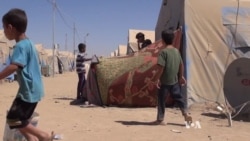Hundreds of thousands of Iraqis have fled attacking Islamic militants in recent weeks. The semi-autonomous Kurdistan region in the north has become a haven for many of these people -- and others have fled Syria's civil war.
The U.N. High Commission for Refugees and other aid groups have worked with the Kurdistan Regional Government to set up camps where these people can be sheltered and protected by Kurdistan’s Peshmerga military. VOA’s Jeffrey Young spent a day at one camp near the capital, Irbil.
Thousands of refugees live in Camp Khazer in Irbil. They settled in blistering heat, with the few things they carried from home as they fled the militants of the Islamic State in the Levant -- or Syria's civil war.
Khaled Ahmad Ali said he was wounded by a Syrian “barrel bomb” attack on Mosul. He said he and his family want to be relocated far away.
“I will never go back to Mosul. We want the U.N. or someone to take us to a new country, in Arabia or Europe or somewhere,” said Ali.
Forced to flee
The U.N. High Commissioner for Refugees, Antonio Guterres, calls the flow of refugees staggering.
“We have more than 220,000 Syrian refugees in Iraq that are in Kurdistan, essentially. And, we have internally displaced [persons] that all together, represent more than two million,” said Guterres.
Camp Khazer provides shelter to people from all religious and ethnic groups. While many say they want to stay in Kurdistan, others want to be close to their own communities.
Ibrahim Ismael Hassan, a Turkman from Tal Afar, Iraq, said, “Terrorists drove us out of Tal Afar with bombings. We want to go to Najaf, but there is no way to get there. We spent all of our money already.”
Kurdistan Regional Government
The Kurdistan Regional Government runs this clinic. Every day, three to four hundred people come to the dispensary, run by Rizgar Haji. Because of the barren conditions, minimal sanitation, and blistering heat, he said, many refugees are ill.
“We realize that vomiting and diarrhea is related to the bad food, and maybe because of the heat. Their food -- they do not have a refrigerator to keep their food in the correct ways. So that’s why, for most of them, they get, you know, disease,” said Haji.
Inside the tents, it is stifling hot, but still better than baking in the blazing summer sun. And there are, for some people, a few things to keep themselves occupied.
Despite the squalid conditions, many here find ways to maintain their dignity, and find a reason to smile. Especially the children.






